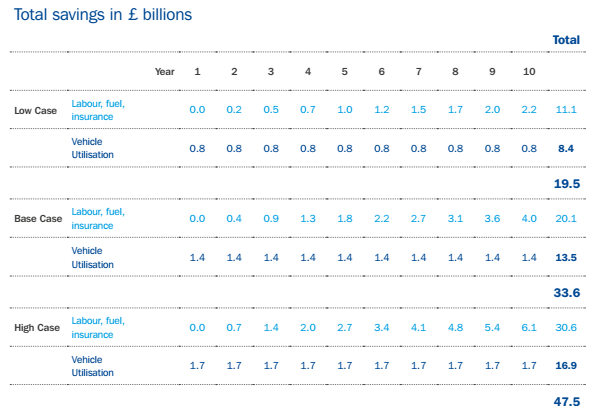
According to a new study completed by Axa UK, driverless trucks could save the
haulage industry between £19.5bn and £47.5bn after just 10 years.
The study, titled
The Future of Driverless Haulage, shows the anticipated cost savings across four main categories which are labour, fuel, insurance and vehicle utilisation. The estimated base savings across the four categories is £33.6bn after 10 years.
The study was commissioned by Axa and carried out by Douglas McNeil, an independent financial analyst and transport and logistics expert, to discover the impact of introducing driverless trucks to the transport industry, which currently employs 2 million people, 10% of whom work in road haulage.
Driverless technology and its social benefits in the motoring industry have already been attracting interest across the world, the technology and its impact on the world of logistics could deliver even greater social benefits.
If the cost savings that could be made from driverless trucks were to be passed on to the consumer this would equate to over half of a person’s weekly retail expenditure or nearly 10 days’ worth of food shopping*.
The savings are expected to come from:
-
Labour – wage bills will reduce as the need for drivers is eliminated
-
Fuel – lower fuel bills as trucks can be programmed to travel more efficiently than humans this includes operating at optimal speeds and moving in close convoys.
-
Insurance – savings would be made if driverless vehicles are proven to be less likely to crash than manned ones.
-
Vehicle Utilisation – savings would be made from the fact that driverless trucks would not be restricted to the amount of hours they can operate like current drivers.

Savings predicted over 10 years
Almost every industry in the UK needs to some extent the transportation of goods from one location to the next and the cost of doing so is fed through to the end customer. If the overall cost of haulage is reduced dramatically by introducing driverless trucks it stands to reason that the cost of many goods will fall as well.
David Williams, Axa’s head of underwriting, said: “The results confirmed our suspicion that automated freight will not only be much more efficient and make the roads safer for other users, it will also reduce the prices of the end products that we all buy.”
He added that heavy goods vehicles were involved in 6,000 road accidents in 2013, comprising a total of 8,448 casualties, 258 of which were fatalities.
“These are preventable, human-error accidents and the introduction of driverless technology has the potential to transform the haulage industry, with significant implications for the UK’s roads, in terms of safety and congestion, for its environment, business and the UK economy as a whole.”
Read the
driving forces behind driverless trucks.
Image credited to Daimler.